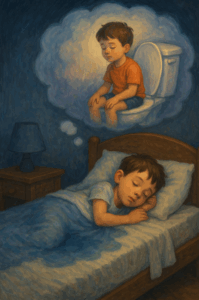🌙 Dreams and Bedwetting: What’s the Connection?
 Ever heard your child say:
Ever heard your child say:
“I dreamt I was on the toilet… and then I woke up wet.”
As a psychiatrist specializing in child and adolescent mental health, I hear this story often—and it’s not just a coincidence. The connection between dreams and bedwetting (nocturnal enuresis) is real, fascinating, and often misunderstood.
🧠 What Really Happens in the Brain?
During sleep, we cycle through different stages—from light sleep (NREM) to deep sleep and REM sleep (when we dream).
In most children, as the bladder fills, signals are sent to the brain, triggering either:
-
A wake-up response → the child goes to the toilet
-
Or a hold-it-in response → the brain inhibits urination until morning
In bedwetting children, one or more of these systems is immature or delayed:
-
They may sleep too deeply to notice the bladder signal
-
The brain-bladder connection isn’t fully developed
-
The brain may “misinterpret” the signal, leading to a dream of urinating—and the body responds as if it’s real
This is especially common during REM sleep, when the brain is highly active, but the body’s control systems are relaxed.
🛌 Why Do Some Children Dream of Urinating?
These dreams are often vivid:
-
Sitting on a toilet at school
-
Finding a bathroom after a long walk
-
Getting wet in the rain or swimming
These dreams are the brain’s way of processing the full bladder signal—but instead of waking the child, it integrates it into the dream.
Think of it as a “missed alert.”
❗Is It Psychological?
Only sometimes.
While primary enuresis (the child was never dry) is more likely related to sleep depth or bladder maturity, secondary enuresis (relapse after being dry) might reflect:
-
Stress, anxiety, or trauma
-
Changes in environment (e.g., school, moving house)
-
Emotional conflict the child doesn’t verbalize
In such cases, dreams may carry emotional content, not just bladder signals. Nightmares or “toilet dreams” may appear more often.
✅ What Parents Can Do
1. Reassure the Child
“Dreams can be tricky. Your brain got confused. We’ll work together to help your body wake up in time.”
Avoid scolding or punishment. Bedwetting is not a sign of laziness or defiance.
2. Pre-Bed Routine
-
Limit fluids 2 hours before sleep
-
Encourage double voiding (pee twice, 10 minutes apart)
-
Talk gently about the day—help reduce stress
3. Keep a Dream & Wetting Diary
Track:
-
Time of wetting
-
Dream content (if remembered)
-
Foods, drinks, stressors
Patterns may emerge that help guide behavioral or therapeutic intervention.
4. Try Bedwetting Alarms
If the child wets during REM sleep, a bedwetting alarm may help them associate bladder fullness with waking up, rather than dreaming.
🩺 When to Seek Help
Consult a doctor or child psychiatrist if:
-
Bedwetting continues past age 7
-
Daytime wetting or urgency is present
-
The child reports frequent distressing dreams
-
Emotional changes, anxiety, or school stress are evident
💡 Final Thought
Not all dreams are just dreams—sometimes, they’re your child’s brain trying to make sense of a full bladder. Understanding the connection can take away the shame and bring in strategy.
Dr. Srinivas Rajkumar T, MBBS, MD (Psychiatry)
Consultant Psychiatrist
Apollo Clinics Velachery & Tambaram
🌙 Child & Adolescent Mental Health Specialist | Dream & Sleep Disorders
🌐 Visit: www.srinivasaiims.com
📞 Consult Online or In-Person